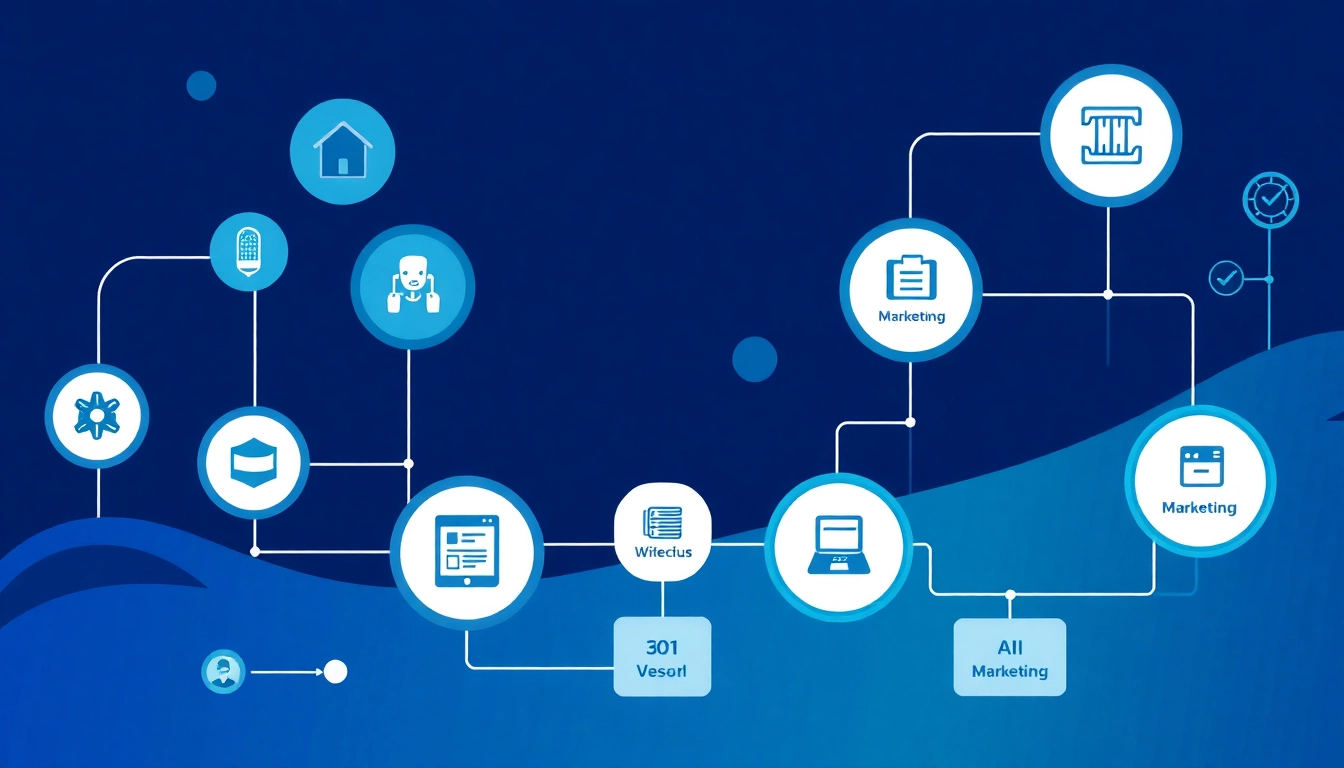
Understanding AI Marketing Tools
What Are AI Marketing Tools?
In the rapidly evolving landscape of digital marketing, AI marketing tools have emerged as transformative instruments that help businesses analyze data, optimize performance, and enhance customer engagement. These tools leverage artificial intelligence (AI) technologies to automate repetitive tasks, provide insights, and create personalized experiences. By utilizing AI, marketers can gain deeper insights into consumer behavior, efficiently allocate resources, and tailor their campaigns to meet the unique needs of their target audience.
How AI Tools Revolutionize Marketing
The adoption of AI tools in marketing signifies a paradigm shift from traditional methods to data-driven strategies. AI can analyze vast amounts of data in real time, making it possible to identify patterns and trends that would be impossible for a human to see. This capability allows businesses to understand their customers better and predict their behavior, ultimately leading to more effective marketing strategies. Furthermore, AI tools facilitate automation, reducing the time marketers spend on mundane tasks such as data entry, email follow-ups, and customer segmentation, allowing them to focus on strategic planning and creative initiatives.
Key Benefits of Using AI in Marketing
The integration of AI into marketing practices offers several key benefits:
- Enhanced Efficiency: AI can automate data collection and analysis, thus speeding up marketing campaigns and decision-making.
- Improved Customer Insights: Through predictive analytics and customer segmentation, businesses can understand their customers’ needs and preferences more accurately.
- Personalization: AI enables tailored marketing messages and product recommendations, enhancing customer engagement and satisfaction.
- Cost Savings: Automating repetitive tasks can reduce overhead costs and allow for better allocation of human resources.
- Real-Time Analytics: AI tools provide immediate feedback on marketing campaigns, allowing for rapid adjustments and improved performance.
Most Effective AI Marketing Tools in 2025
Overview of Top Tools
As we look toward 2025, several AI marketing tools have gained prominence for their effectiveness and user-friendly features. Each tool offers unique functionalities designed to address various aspects of marketing. Some of the leading tools include:
- HubSpot: An all-in-one marketing, sales, and service software that utilizes AI for optimizing customer interactions and automating workflows.
- Jasper: This AI writing tool specializes in generating high-converting marketing copy based on context and tone.
- Surfer SEO: It helps optimize content for search engines by analyzing competition and providing guidelines for keyword usage.
- Canva AI: This tool offers design capabilities powered by AI, enabling marketers to create stunning visuals effortlessly.
- FeedHive: A social media management tool that uses AI to recycle and repurpose existing content, maximizing its reach and engagement.
Comparing Features and Pricing
When choosing an AI marketing tool, it is essential to compare the features, usability, and pricing of each option. For instance, while some tools offer free tiers with basic features, others might require a subscription. Here’s a brief comparison:
| Tool | Key Features | Pricing |
|---|---|---|
| HubSpot | CRM, email automation, lead generation | Starting at $50/month |
| Jasper | Content generation, copywriting | Starting at $29/month |
| Surfer SEO | On-page optimization, keyword suggestions | Starting at $49/month |
| Canva AI | Graphic design, visual content creation | Free with limited features, Pro at $12.99/month |
| FeedHive | Social media scheduling, analytics | Starting at $19/month |
Analyzing such details can help businesses select the best tools that align with their specific marketing goals and budget.
User Reviews and Recommendations
User reviews play a crucial role in assessing the effectiveness of AI marketing tools. Many marketers praise tools like HubSpot and Jasper for their ease of use and robust features. For instance, users often highlight HubSpot’s intuitive dashboard and comprehensive analytics as game-changers for their marketing strategies. On platforms like Reddit, discussions frequently mention the personalization capabilities of Jasper, with many users noting how its AI-generated copy saves them time while maintaining high quality.
Implementing AI Marketing Tools
Steps to Integrate AI Tools in Your Strategy
Successfully implementing AI marketing tools requires a structured approach. Below are key steps to ensure a smooth integration:
- Assess Your Needs: Identify specific marketing challenges and goals you want to address with AI tools.
- Research and Select Tools: Compare features and invest in tools that fit your budget and meet your business requirements.
- Train Your Team: Provide training for your team on how to effectively use these tools to maximize their potential.
- Start Small: Implement one or two tools at a time and evaluate their performance before scaling up.
- Monitor and Analyze: Continuously track the performance of these tools and adjust your strategy based on data-driven insights.
Best Practices for AI Tool Usage
To optimize the effectiveness of AI marketing tools, consider these best practices:
- Set Clear Objectives: Define what success looks like for each marketing campaign and ensure tools are aligned to these goals.
- Utilize Data Wisely: Focus on collecting and analyzing quality data to improve the accuracy of AI insights and suggestions.
- Stay Updated: The technology in AI is constantly evolving; keep abreast of updates and enhancements to your tools.
- Cultivate a Culture of Learning: Encourage team members to continuously experiment and learn from the analytics provided by AI tools.
Common Pitfalls to Avoid
While employing AI marketing tools can be beneficial, there are common pitfalls to be aware of:
- Over-Reliance on Automation: Automation is powerful, but personal touch and human oversight remain essential for building relationships with customers.
- Neglecting Training: Failing to properly train staff on AI tools can lead to ineffective usage and lack of confidence in the technology.
- Ignoring Data Compliance: Ensure that data compliance regulations (such as GDPR) are followed when handling customer data through AI tools.
- Underestimating Costs: While some AI tools may seem economical upfront, hidden costs and subscription fees can add up. Always evaluate the total cost of ownership.
Measuring the Impact of AI Marketing Tools
Key Performance Indicators (KPIs)
Measuring the effectiveness of AI marketing tools is crucial to understanding their impact on your overall marketing strategy. Key Performance Indicators (KPIs) might include:
- Conversion Rate: The percentage of users who take a desired action, such as purchasing a product after interacting with an AI-powered campaign.
- Return on Investment (ROI): Calculating the profitability of AI marketing initiatives against their total cost helps assess their effectiveness.
- Customer Retention Rate: Monitoring how many customers remain engaged over time provides insights into the effectiveness of personalized marketing efforts.
- Engagement Metrics: Metrics such as click-through rates, social media shares, and comments gauge how compelling your content is.
Analytics Tools for AI Systems
Utilizing analytics tools is critical for interpreting the data generated by AI marketing systems. Tools like Google Analytics, SEMrush, and HubSpot Analytics offer in-depth insights into user behavior, campaign performance, and overall marketing trends. By regularly analyzing this data, marketers can make informed decisions, pivot strategies when needed, and fine-tune their use of AI marketing tools for better outcomes.
Case Studies of Successful Implementations
Several companies have successfully integrated AI marketing tools into their strategies. For instance, a renowned e-commerce platform utilized AI-driven product recommendations to enhance the customer shopping experience, resulting in a 20% increase in sales over six months. Similarly, a leading travel agency employed chatbots powered by AI to manage customer inquiries and bookings, significantly reducing response times and boosting customer satisfaction ratings.
The Future of AI in Marketing
Emerging Trends to Watch
The future of AI in marketing looks promising, with several emerging trends expected to reshape the industry:
- Voice Search Optimization: As more consumers use voice-activated devices, optimizing content for voice searches will become crucial for marketing success.
- Hyper-Personalization: Advanced AI algorithms will enable marketers to create more tailored and individualized experiences for consumers based on their behavior and preferences.
- Predictive Analytics: The use of AI to forecast trends and consumer behavior will become increasingly prevalent, allowing businesses to anticipate needs and respond proactively.
- Augmented Reality (AR) Experiences: Combining AI with AR can provide immersive marketing experiences, enhancing customer engagement in retail settings.
Innovative Technologies on the Horizon
Technologies like AI-driven content generation and advanced machine learning algorithms are paving the way for smarter marketing practices. Innovations such as sentiment analysis, where AI gauges customer emotions from feedback or social media interactions, will help businesses craft more empathetic and impactful marketing messages. Additionally, the rise of advanced chatbots capable of human-like interactions will further streamline customer service and enhance user experience.
Preparing for Changes in Marketing Strategies
As AI continues to evolve, businesses must remain adaptable and prepared for changes that will impact their marketing strategies. Continuous learning and staying updated with AI innovations will be essential for marketers to harness the full potential of these tools. Organizations should also foster a culture that embraces change and encourages experimentation, ensuring they remain competitive in an increasingly digital landscape.





